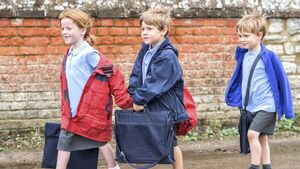Living Greener: Mourning the loss of childhood independence

Today, most children are accustomed to being enclosed all their lives, whether in cars or in cement institutions
WHEN I talk to elderly people around here, I’m struck by how warmly they remembered walking to school -- something that is much more difficult in these days of boy racers and giant lorries.
Most of them, remember the journey to and from school far more than they remember the classes themselves.
They spent it hunting for birds’ nests – each child took it upon themselves to look after the eggs or chicks, checking on them each day.
While they brought a lunch each day, they also fed themselves off berries and mushrooms along the way, or picking apples from orchards or turnips from fields – and occasionally being chased away by the farmer.
This, too, seems to have been a universal pastime, mentioned frequently in children’s stories from the 1800s, or by the childlike hobbits of Tolkien’s stories.
Its ubiquity could be seen in a 19th-century gardening book I saw once; its list of garden pests included, after beetles and boll weevils, “boys.” If your garden is infested with boys, the author noted drily, an aggressive dog might be just the thing.
Not that children spent most of their time raiding crops; they packed more activity into the walk home each day than modern children do with their entire summer vacation.
‘If the journey to school took thirty minutes, the coming home could take anything up to two hours,’ wrote Alice Taylor. ‘Making pools of well water for the birds to swim, stretching out in the sun and making up fanciful stories, checking on birds’ nests along the way … being invited in for tea by neighbours, and picking blackberries and sloes, burying them in bottles and then forgetting where they were buried. … Finally, we arrived sun-soaked and relaxed, with school almost forgotten because it was, after all, only one part of a much larger cycle of education.’ No elders I talked to described being afraid of adults in those days. On the contrary, adults everywhere looked after children and kept them in line.
Strangers were rare in a village; the children knew everyone, everyone talked to everyone else, and gossip was a powerful tool for keeping people in line. Nor could children get away with much either, not with so many eyes on them, connected to people who talked to their parents every day.
For example, Christine, born in 1937, recalls that at the age of five, 'I don't often remember a parent coming down and telling us it was time for us to go home. And I don't think many of us would have a watch. So we knew it was time to go home when we saw people going home from their work.'
This has a profound effect on the freedom and independence that most children enjoyed, to a degree that would be viewed as insane by most modern parents.
More than 20 years ago, a UK study drew attention to the shrinking neighbourhood domains of childhood by highlighting the dramatic loss in a child’s independent home range within just three family generations; a young boy in Sheffield in 1919 had permission to walk alone almost 10 kilometres to a favourite fishing spot, compared with his great-grandson, who was only allowed to travel on his own the 300 metres to the end of his street (Hillman, Adams, and Whitelegg 1990).
It’s hard to absorb how much childhood norms have shifted in just one generation. Actions that would have been considered paranoid in the ’70s — walking third-graders to school, forbidding your kid to play ball in the street, going down the slide with your child in your lap — are now routine.
In fact, they are the markers of good, responsible parenting. One very thorough study of “children’s independent mobility,” conducted in urban, suburban, and rural neighborhoods in the U.K., shows that in 1971, 80 percent of third-graders walked to school alone. By 1990, that measure had dropped to 9 percent, and now it’s even lower.
Today, most children are accustomed to being enclosed all their lives, whether in cars or in cement institutions, often staring at screens – preparation for an adult life doing the same.
Accordingly, we are seeing serious mental and physical health problems skyrocket among children, problems that were unknown in previous generations. We are slowly realizing that this hasn’t been good for any of us.





